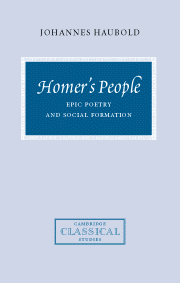Book contents
Introduction Between the omnipresent hero and the absent polis
Published online by Cambridge University Press: 05 June 2014
Summary
The history of scholarship on Homeric laos is quickly written. In 1977 Latacz pointed out that the word was little understood and that a thorough investigation was overdue. Since then some progress has been made. Welskopf collected and discussed the material as part of her study of ancient social typology. Others have added further observations; but useful as they may be, none of these publications have decisively changed the situation.
When Latacz declared our lack of understanding of the Homeric laos, he rejected the view that had been current before him. This view goes back to Jeanmaire, who argued influentially that Homeric laoi designate a social grouping of male adult warriors. Jeanmaire's idea was taken up and elaborated among others by Heubeck, who suggests a class opposition between epic laos and demos, which he traces back to Mycenean times. It was this elaborated version of Jeanmaire's theory which was attacked in the late seventies by Latacz and others. Latacz himself approaches the problem from the point of view of the social historian and comes to the conclusion that epic laos does not designate a social or military elite which can be seen in contrast with the demos. Around the same time van Effenterre re-examined the issue from the viewpoint of the linguist. He writes at the end of his careful and detailed study:
The laoi can equally well be the soldiers of an army as the members of any crowd. The only constant meaning one can ascribe to the term is that of an undifferenciated, and we might add, subordinate mass of people, viewed as being in an inferior or precarious situation.
- Type
- Chapter
- Information
- Homer's PeopleEpic Poetry and Social Formation, pp. 1 - 13Publisher: Cambridge University PressPrint publication year: 2000



